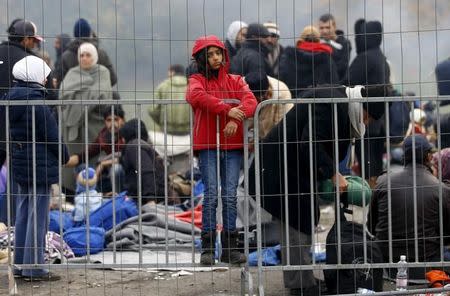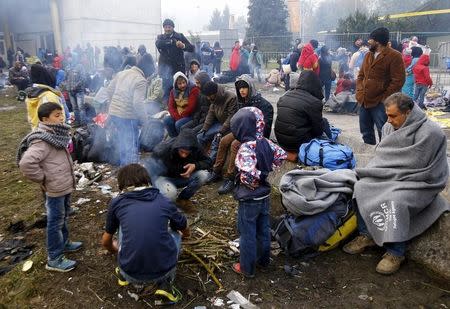Fly, don't walk, EU will urge Balkan migrants
By Alastair Macdonald and Francesco Guarascio BRUSSELS (Reuters) - The European Union plans to persuade refugees to wait in Greece for paid flights to other countries offering asylum rather than risk dangerous winter treks through the Balkans, EU officials said on Monday. Pledging to act fast on agreements by Balkan leaders on Sunday to slow and control the flow of Syrians and others making their way to Germany from Turkey, officials acknowledged people would keep coming and said persuading them to accept orderly relocation arrangements would be vital. "The idea is also to convince the Syrian father that it is better to stay in Greece with his family until they can be relocated," one EU official said, noting the difficulties tens of thousands of people face out in the open in the Balkans. Free flights to safe countries would be a much better option, the official said, than uncertain treks to the north. The United Nations refugee agency (UNHCR), which worked with the EU and non-EU states in the region to formulate Sunday's plan stressed the need for immediate action to save lives, though questions remain over how fast resources will be available and how squabbling neighboring governments will start to cooperate. "Measures agreed yesterday have to be applied immediately and completely," said UNHCR spokeswoman Carlotta Sami. "We have already had several cases of hypothermia among people waiting in the cold... There is a risk of tragedies due to the weather." The agreement foresees places for 100,000 people waiting for asylum claims to be assessed, 50,000 in Greece and 50,000 in Balkan states further north. The EU has promised funds to Greece and the other countries to provide emergency help. At the meeting, involving 11 countries and held at the initiative of German Chancellor Angela Merkel, Greek Prime Minister Alexis Tsipras was pressed to do more to document those arriving. The final joint statement said policies of "waving through refugees" toward neighboring countries must end. Tsipras himself stressed that the root of the problem lay in Turkey, from where most Syrians and Iraqis, as well as migrants from South Asia, head by sea to nearby Greek islands. The EU is negotiating separately with Turkey to control those flows. Several diplomats and EU officials said there were signs that Tsipras, who has had rocky relations this year with Berlin and Brussels during negotiations on a euro zone bailout, was stepping up cooperation on the migrant crisis after months in which officials have complained about a perceived lack of will in Athens. A priority now for Greece will be the provision of some 20,000 new places to house people temporarily by the end of the year, in addition to the existing 10,000, EU officials said. A further 20,000 places should be provided later. The Greek government has resisted setting up camps. EU officials said places could be provided in other ways, such as hotels or private apartments. Those identified as economic migrants to be returned to their home countries could be kept in secure units, however. A major part of EU efforts to ensure Greece and Italy do not simply help undocumented migrants travel through to reach richer parts of northern Europe has been a new scheme to relocate those likely to be granted refugee status in other EU states. That has set governments against each other and has got off to a slow start. So far fewer than 100 people have been flown from Italy to northern countries and none as yet from Greece. EU officials said the scheme, intended to take up to 160,000 people over the next two years, would accelerate once migrants could be reassured that it would work. Many had been reluctant to agree to it, officials said, fearing they might be deported. (Additional reporting by Michelle Kambas in Athens; Editing by Louise Ireland)


